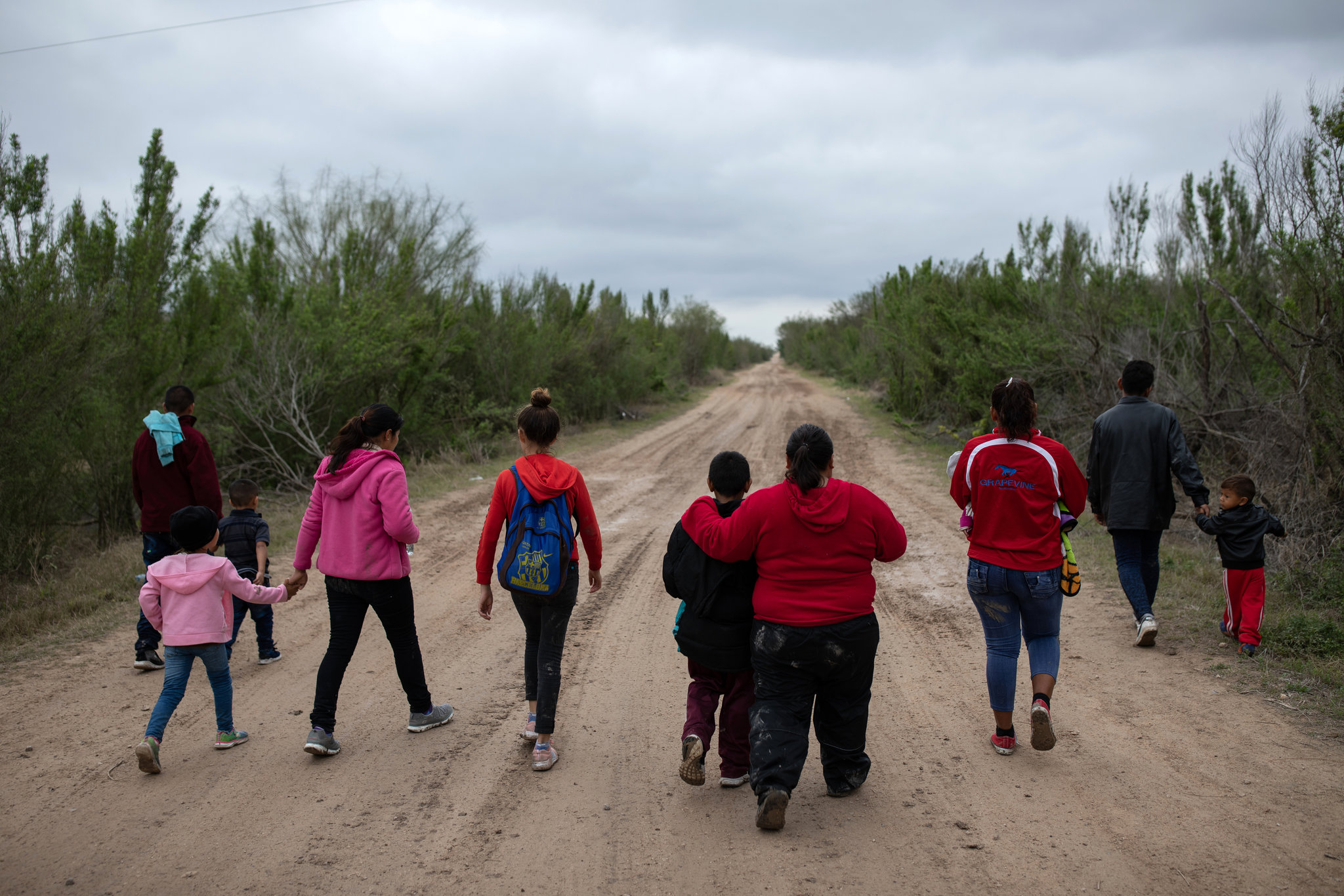As various global crises continue to stimulate substantial waves of migration on both sides of the Atlantic, the United States and the United Kingdom are taking parallel steps to close their doors to migrants in need.
In the United States, the Department of Homeland Security recently published a new rule, set to go into effect later this year, that would largely deny migrants the opportunity to apply for legal asylum in the U.S. should they fail to enter the country through a legal port of entry. Such “illegal” entrants would only be eligible for asylum if they could prove they were denied protection in another country they had traveled through on the way to the U.S.
Concurrently, in the United Kingdom, the Conservative government has introduced a bill that would mandate the detention and “swift removal” of all migrants arriving on U.K. shores in small boats from across the English Channel. Those detained would be deported back to their home countries, or to a “safe third country.” Deportees may be able to apply for asylum following their removal, but removal will establish a presumptive bar against their ability to ever return to the U.K. or seek legal residency status.
Both the U.S. and the U.K. are faced with legitimate challenges in the form of significant flows of migrants, but both governments have turned to exclusionary, immoral solutions that are not guaranteed to bring about positive results.
Legitimate Problems
Since 2020, scores of migrants have attempted to cross the U.S.’s southern border, but in this period, more than 2 million have been turned back. At the beginning of the COVID-19 pandemic, the Trump administration invoked Title 42, a section of a public health law that allowed the administration to expel most arrivals at the southern border under the guise of protecting public health and safety. President Biden initially attempted to overturn Title 42 last year but the repeal was put on temporary hold by the Supreme Court. However, the policy is set to expire in May of this year. Biden’s Department of Homeland Security has thus sought to continue imposing harsh restrictions on asylum seekers beyond Title 42’s expiration for fear that ending the restrictions will lead to a massive influx of immigrants.
From arrivals in the low hundreds pre-pandemic to more than 45,000 last year, Channel crossings have quickly outgrown the capacity of the British immigration system. As in the U.S., the process of applying for asylum can take months or even years in the United Kingdom, and the situation is only worsening as more migrants arrive. The U.K.’s trouble is also linked to the deterioration of its relationship with the EU post-Brexit. Britain had, until recently, been unable to secure the partnership of France to help stop small boats crossing the Channel as well as to take back migrants the U.K. rejects. However, Prime Minister Rishi Sunak and French President Emmanuel Macron have announced a new deal in which Britain will pay the French government nearly £500 million over the next three years to fund additional immigration enforcement and detention centers. But it remains unclear whether France will be able to develop an effective means of dealing with a migrant crisis that all of Europe has struggled to address.
Political Will for Immigration Crackdowns
Perhaps the more important piece of context in the case of both the U.S. and the U.K. is the state of current political discourse about immigration.
Recent polls show that a majority of Americans (53%) disapprove of President Joe Biden’s handling of immigration. Thus understandably the administration sees the need to demonstrate firm policy action in this area. However, it is unclear what exactly the American public wants to see. An August 2022 Gallup poll found that 38% of Americans wanted to see immigration decrease but 58% either supported increasing immigration or maintaining the present level. Further polling shows that a majority of Americans support increased security along the southern border (73%), but a majority also supports the opening of pathways to legal residency for undocumented immigrants (60%). In the face of inconclusive public opinion, the Biden administration seems to be primarily concerned with preventing a public relations circus should an influx of migrants cross the southern border once Title 42 ends. It is also worth noting that the pressure to deliver effective immigration policy is squarely on the President and the executive branch, given Congress’s repeated failure to pass any comprehensive immigration reform.
In the U.K., Rishi Sunak’s government is likewise struggling to secure support. The party is highly unpopular with voters, and 72% of Britons disapprove of the government’s handling of immigration policy. Importantly, 57% of Britons think that the current levels of immigration are too high, and 54% believe that, at most, only a minority of those crossing the Channel actually have legitimate claims of fleeing persecution. The political climate thus seems ripe for a crackdown on immigration, particularly at a time when the government is hungry for political victories and still trying to ride the nationalist wave that led to Brexit.
Inhumane Solutions
Both nations have legitimate problems they need to address but their chosen solutions serve politics, as well as ideologies of xenophobia and exclusion, rather than humanitarian issues.
The Biden administration, elected on a platform of loosening immigration restrictions, has been careful not to paint itself as being backed into a corner and be viewed reluctantly adopting a policy o avoid a crisis given its limited capabilities. As one administration official put it, “To be clear, this was not our first preference or even our second.”
But what other choices did they have? For one, they could have chosen to invest more resources in asylum processing. This was initially how the administration planned to replace Title 42. Though officials were worried about the prospect of dealing with a significant influx of migrants, they were generally confident they could handle it; that confidence has now disappeared without explanation.
The current processes set up to allow those outside of the U.S. to apply for asylum are incredibly slow, and plagued with issues and obstacles. This forces desperate migrants to wait long periods of time in their home countries, or in similarly unsafe Mexico, before being allowed to enter the U.S. Long waiting times under perilous conditions, or attempt to cross the border and evade watchful authorities, contributed to a record number of migrant deaths last year. All of this should be viewed as a failure to perform our humanitarian duties to desperate people in search of a better life.
The policy is also utterly racist in that it serves to brand poor Black and brown migrants who struggle to access legal channels as “undeserving” of aid from the United States. The entire idea that just because someone crossed the border “illegally” they are somehow a bad person who is disqualified from being granted protection by the United States is disgusting, and has its roots in the long history of how race has shaped who is deserving of being in this country.
Virtually all of the above claims apply to the United Kingdom as well, but in an even more extreme fashion. Likewise, the U.K. government has chosen to exclude migrants rather than invest in more resources to support their overburdened asylum system. This choice demonstrates a callous level of laziness and disregard for peoples’ well-being on behalf of both governments. They can see that their legal processes are inadequate but have chosen to simply kick people out as opposed to trying to make the process more efficient.
But unlike the Biden administration, the Conservative government has unabashedly promoted xenophobic rhetoric and stoked fears of an “invasion” of foreigners. Of the 45,755 migrants who crossed the Channel last year, more than 80% were from conflict-ridden countries such as Afghanistan, Iran, Iraq, and Syria. However, British Home Secretary Suella Braverman, speaking in support of the bill in Parliament, accused opponents of wanting to allow “all the Albanian criminals to come to this country,” and spoke of how 100 million people who could qualify for protection under U.K. laws “are coming here.”
Glossing over the incorrect nature of these claims, they each strongly connote a status of criminality and threat upon tens of thousands of people merely hoping to start a better life. These statements are a clear attempt to evoke racist and xenophobic fears of outsiders “polluting” British society. This type of fear-mongering about an incoming mass of poor migrants helped bring about Brexit, and the Conservatives are again employing it to try to score political points.
Uncertain Consequences
Beyond considerations of morality, there is another major issue with immigration crackdowns like these: there is no guarantee that they will work. Claims that anti-immigrant policies serve to deter migrants or ease the burden on governments are simply not backed up by consistent evidence. Taking Title 42 as an example, there have been substantially more arrests at the U.S.-Mexico border since March 2020 than during previous periods. This increase in apprehensions is partially due to an increase in repeated attempts at crossing the border by those previously apprehended and expelled. In 2019, only 7% of apprehended migrants had previously crossed the border that year, compared to nearly 1 in 3 migrants now.
Also, the concept that impoverished migrants from war-torn countries will be deterred by complex legal arrangements is not entirely convincing. As described by Peter William Walsh, a senior researcher at Oxford University’s Migration Observatory, “to date, there is surprisingly little evidence that asylum deterrence policies put people off in large numbers, for the simple reason that asylum seekers often have little understanding of what policies will face them after they arrive.”
In the case that these policies fail to produce any deterrent effect, they simply create even larger burdens for governments to handle. Nearly a decade ago, Australia introduced a policy strikingly similar to the U.K.’s and did so behind the same “stop the boats” slogan now pedaled by Rishi Sunak. Beginning in 2012, migrants arriving in Australia by boat were taken to detention centers in Papua New Guinea and Nauru. These centers filled up so quickly that most of the migrants were eventually brought back to Australia. It is thus very much an open question as to whether the U.K. will be able to handle detaining and “swiftly removing” so many migrants, whether their new agreements with France will be effective, and whether a suitable “safe third country” can be found to take asylees—particularly given the deep concerns over the safety of the government’s plan to send many to Rwanda where political and ethnic violence are concerningly common.
Faced with legitimate crises in dealing with surging numbers of migrants, two of the world’s supposedly foremost democracies have chosen politics over people, xenophobia and racism over humanitarianism, and exclusion over the rehabilitation of domestic institutions. However, these actions are unsurprising. Anti-immigrant rhetoric and policies have flooded the Western world over the past few years as scores of people have fled impoverished and unsafe countries often destabilized by histories of harmful colonial interference. It is often far easier to shut one’s door to outsiders than to welcome them in and give them the support they need. In two nations whose power and wealth were built on the backs of willing and unwilling immigrants and conquered foreign peoples, doors are being firmly shut in the face of those in need: poor migrants whose races, ethnicities, and backgrounds supposedly make them less deserving of sharing in the dream of democratic liberty and prosperity.
Featured Image Source: New York Times







Comments are closed.